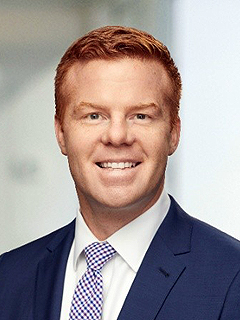Transcript
Intro: You’re listening to Supply Chain @ KPMG. A KPMG podcast series that addresses your supply chain needs from strategy through execution.
Mary Rollman: Welcome to the KPMG supply chain podcast. My name is Mary Rollman, and I lead the supply chain practice here at KPMG. Today we're diving into a topic of procurement. Joining me is Chris McCarney, our offering leader for procurement. Chris, would you like to kick things off with a brief introduction of yourself?
Chris McCarney: Yeah, hi, thanks, Mary. Thanks for having me. Chris McCarney here, as Mary mentioned, I have the good fortune of overseeing our procurement really and our outsourcing advisory business here at KPMG. I've been with the firm since 2007, and I'm talking to you today from the Chicagoland area.
Mary Rollman: Awesome thanks Chris. Why don't we just jump in, because I think it might be great to first describe how KPMG's procurement and outsourcing consulting services, what they do and how they help organizations drive business value.
Chris McCarney: Yeah, so in procurement outsourcing, um, we attach value for our clients in a couple of different ways. I would start with what we think is the most obvious one is to the extent that we want to extract value or optimize costs in an external relationship. Albeit the supplier that that's delivering goods or services to, you know, support the product that our clients deliver or these services that our clients deliver, we focus on optimizing those relationships. The other component of this is really we step back with our clients and help them view procurement as a function and help them get what I would call functionally fit. And that relates to talent, process, enabling technologies, all that go into really cost of function or cost to serve as a procurement organization.
Mary Rollman: So, I want to go a click further on what you were just saying, which is how leading organizations are actually elevating the role of procurement and using it for a competitive advantage, not just cost savings. I'd love to hear your perspective on how organizations are doing that.
Chris McCarney: Yeah, I'm glad you, you framed it under not just cost savings. We typically use the term value generation. So as one could imagine, in addition to cost, the supply base can be really a great source of innovation. You can attack cash flow. What we see, inside the firm is leveraging our great tax capability, and putting functional capability in place to really optimize tax based on location or the goods or services that the organization is procuring. And then in our outsourcing advisory services, we're helping clients really look, take a look at what is non-core to their business and identify or select a partner or service provider that can take on those those processes or those services and provide them back into the business so our clients can focus on what they're good at.
Mary Rollman: I'm sure this isn't something that people do manually, so how are these organizations using technologies to improve their processes, improve the function overall, especially in this new world of big data and AI.
Chris McCarney: And we can go down a rabbit hole on AI and the different types and the definitions thereof, but in short order, we really see our clients using technology and AI in a couple of different ways, similar to how I describe our services. The first, I would, I would describe it as supply-based monitoring or supply-based sensing whether that's managing risk in the supply base, for example, we have clients that have suppliers that get put on no trade agreements or bad guy lists from the government. We need to monitor those relationships in real time so that our clients aren't doing business with, with bad actors candidly. And I, and I think the other component of it goes back to helping our clients become functionally fit. So in a world of generative AI, for example, our clients are using it to develop category strategies and replacing a lot of the manual effort and work that went into developing a category strategy. We see technologies out there today that are pre-populating purchase orders, are driving more efficiency in the procure to pay process itself. So a lot of that technology, it goes back into again that area of what I would call being functionally fit and driving efficiency.
Mary Rollman: OK, so let's shift gears and start looking forward. What we do is, you know, think and help our clients understand what's around the corner. So from your standpoint, what does the future of procurement look like considering some of the new technologies, as well as some of the more broader global elements around ESG or even global supply becoming a challenge. What should clients be thinking about as they are looking ahead
Chris McCarney: We have clients, whether they're heads of procurement or heads of supply chain that may declare that they're going through an existential crisis. There's, there's no doubt about that because the future isn't, isn't exactly that clear to these procurement organizations. In one hand, there's always going to be a mandate to control costs, drive value, but what we absolutely know is also a mandate to innovate and do it, do it more efficiency, efficiently and do it for less. So what we see is that the procurement function in the future has to reshape itself. We know that headcount isn't growing inside these organizations, and costs needs to maintain, we need to maintain costs and keep them under control. And then ultimately continue to, to get the ROI on or the return on the procurement functional cost that we see. But what does that mean? We know that procurement practitioners need to be digitally savvy. They need to be well versed in, in all the various geopolitical topics at play, and really they need to be agile. So we like to say that the procurement professional needs to be more athletic today than ever before in order to support their enterprise needs.
Mary Rollman: Oh, absolutely. Costs can get out of control very quickly within an organization, and especially as they go through a huge growth mode. So we're gonna wrap up with one final question, and I'd love to hear from you about maybe an inspiring story where procurement and outsourcing consulting made a significant positive impact on an organization that you've worked with. Is there any example that you think of when it comes to the impact that your organization can have with clients?
Chris McCarney: This is a fun one, because most people think this is a pretty dry space, but I actually would look back on my own experience in this space, and I would tell you that I recall as a young consultant early with the firm, we were doing some work in capital improvement work for a large aerospace and defense organization. And we were, as one could imagine, working in procurement organization, attacking DPO for them. We did some great work, but sometimes you, you walk away, you close out a project, you know, client says congratulations, thank you so much, and you move along. But that client actually went on to publish financials, go on earnings calls and talk about the wonderful progress that they were making in working capital improvement and the investor community really reacted positively in that situation. So, I you know, as a young consultant, not only did it inspire me to spend more time in, in this procurement space, but also inspired me in the, in the trade and our craft of being a consultant. So I really enjoyed that. It's, it's great to see the work we do come out for our clients in the public domain and in their financials. I would say the other one for a large oil and gas company, middle of my career, I recall sitting in a steering committee meeting where we were doing some procurement talent work for one of our clients. We helped them design a competency model for their procurement organization. And one of the executives walked in the room, slammed our report and some of our deliverables on the table, and looks at me and said, this is some of the best consulting work I've ever seen. This is really going to move the needle for our people. And this gives them all a path to be a proper procurement supply chain professional in our organization. And if anything, this is, this is great for our people and you're gonna help us develop some great talent. And that was extremely fulfilling as well, to know that in the space of procurement that often goes overlooked, where we can also make a difference from a people talent culture perspective.
Mary Rollman: Because it, it, it all boils down to people run businesses, run companies, and, and it's great to hear a story where you know, we've been able to help our clients. So thank you, Chris. Thank you so much for sharing your insights and your expertise. We know that the role of a supply chain leader is continuing to expand and grow, and procurement is a big part of that as procurement continues to evolve and organizations have more opportunity to leverage it for the advantages that you kind of described for us today, they're going to see a lot of business value. So thank you everyone for your time. Thank you for joining me today. I'd like to thank our listeners for taking the time to hear what we have to say. For more information about this topic or any other topic related to supply chain, you can always check us out online at KPMG/supply chain, and that's all we have for you today.
Thanks for listening to Supply Chain @ KPMG. Be sure to subscribe to be notified of new episodes.






